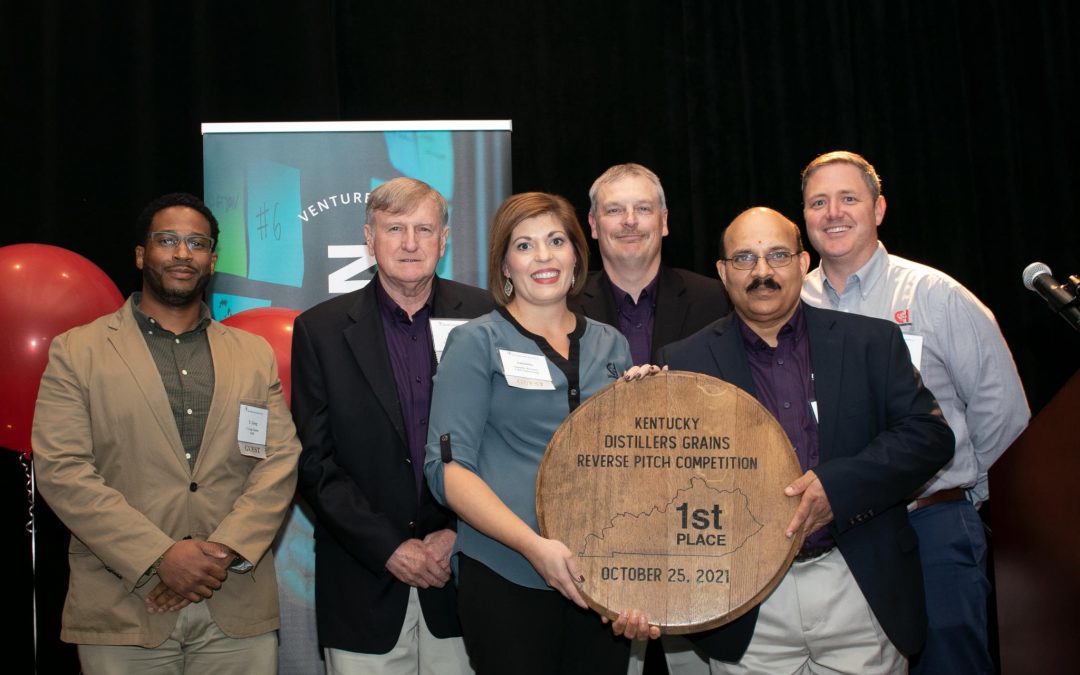The recent “bourbon boom” has been great for Kentucky’s economy, where 95 percent of the world’s bourbon is made, but it has also come with a unique environmental challenge: What to do with the spent grain, or stillage, that is a byproduct of bourbon production?
For every barrel of whiskey produced, approximately 350 gallons of whole stillage are leftover. Traditionally, this has been an inexpensive food supplement for cattle. But today, there is far more supply than demand for these spent grains, Kentucky Department for Environmental Protection Deputy Commissioner Amanda LeFevre said, and if improperly managed, the excess stillage can cause problems for the environment.
Recently, six teams of problem solvers gathered at the Louisville Marriott Downtown to pitch innovative uses for excess stillage before a panel of judges. The Bourbon Reverse Pitch took place during the 25th Distillers Grains Technology Symposium and was organized by the Kentucky Energy and Environment Cabinet, the Cabinet for Economic Development – KY Innovation Office, Innovation Incubated, Kentucky Distillers’ Association, Distillers Grains Technology Council and the University of Kentucky James B. Beam Institute.
Judges selected Louisville-based BioProducts LLC, as the top pitch. The team’s solution focused on processing distillery waste to create three potential high-value products: a natural low-calorie sugar xylose, enhanced protein feed applications, and activated carbon that could be used in the production of batteries.
“We feel it’s a good recognition for our hard work, and I think it’s a good fit for our technology,” said Dr. Jagannadh Satyavolu, founder of BioProductsLLC. “We feel there’s a real opportunity here, especially with the battery applications that are coming in.”
Philadelphia-based SoMax BioEnergy was chosen as the crowd favorite. The team’s proposal focused on using hydrothermal carbonization to recover resources from spent grains that can be used by the distillers or sold as new products.
“It was inspiring to see such creative ideas to allow one of Kentucky’s signature industries to grow while protecting our natural resources,” Energy and Environment Cabinet Secretary Rebecca Goodman said. “We believe that energy, environment and economic development must go hand in hand, and environmentally conscious solutions like these make economic growth all the more sustainable.”
Other participants included Continental Refining Company LLC, Meridian BioTech, LocalSols and Biogas Technology Group. The six participants were chosen from a pool of roughly 40 applicants who submitted ideas this summer.
“A call for ideas went out in July, and for about two months we accepted pitch ideas on new ways of using stillage, whether that be in anaerobic digestion, some sort of food stuff, or some sort of creative new use,” LeFevre said.
Unconsumed stillage is considered an industrial waste and is currently dealt with in a variety of ways including drying, feeding to livestock in its liquid form and placing into lagoons. These lagoons, managed by permitted farms, are regulated by KDEP.
LeFevre said most farmers abide by best management practices when using stillage as feed. However, KDEP has seen instances where lagoons overtop during heavy rains, allowing manure and stillage to run into lakes and streams, polluting them. There also have been instances of disposal of stillage in sinkholes.
“Once you put it into sinkholes, sometimes it travels into groundwater and can wind up in creeks and cause stream degradation and fish kills,” she
said.
Judges included Jeptha Creed Distillery founder and Master Distiller Joyce Nethery, American Farm Investors founder Brian Luftman, Log Still Distillery Chief Operations Officer and Distiller Lynn Dant and AppliedTechnical Research Senior Manager of Global Research and Development Dr. Blake Layfield.
The winning team will present its pitch to an audience of more than 500 distillery professionals from across Kentucky during the James B. Beam Institute Industry Conference in March 2022. This presentation will give the winning team the opportunity to showcase their technology for the Commonwealth’s distillers annual event alongside the latest in distilled spirits science and technology.
The Distillers Grains Technology Symposium is presented by the Distillers Grains Technology Council, a non-profit organization that serves the fuel ethanol, beverage alcohol and livestock industries, as well as other affiliated organizations and individuals.


Recent Comments